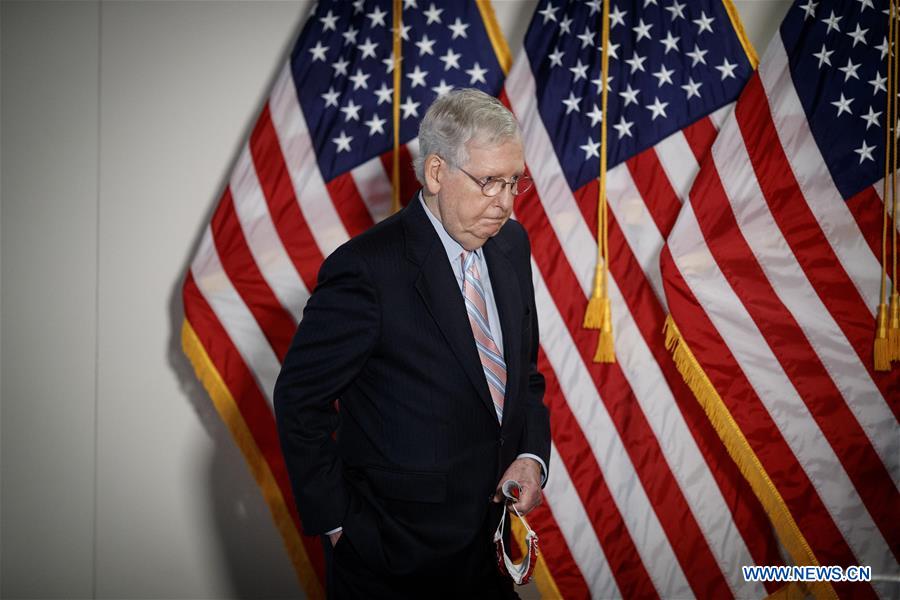
U.S. Senate Majority Leader Mitch McConnell attends a press conference on Capitol Hill in Washington, D.C., the United States, July 28, 2020. U.S. Senate Republicans' newly released 1-trillion-dollar COVID-19 relief proposal has drawn backlash from lawmakers and economists, as the two parties are still far apart from reaching a deal just days before the extra unemployment benefits expire. (Photo by Ting Shen/Xinhua)
WASHINGTON, July 28 (Xinhua) -- U.S. Senate Republicans' newly released 1-trillion-U.S. dollar COVID-19 relief proposal has drawn backlash from lawmakers and economists, and the country's two parties are still far from reaching a deal days before an extra unemployment benefit expires.
As part of the 2.2-trillion-dollar coronavirus relief bill passed in late March, Congress agreed to provide 600-dollar federal unemployment benefits per week on top of state unemployment benefits, which are set to expire at the end of July.
The Senate Republicans' proposal, unveiled Monday, would slash the federal benefits to 200 dollars through September, giving an unemployed worker about 70 percent of previous wages when combined with state benefits, while Democrats want to maintain the current level of benefits through January.
"If you've lost your job through no fault of your own, Republicans want you to take a 30 percent pay cut. Can you believe that?" Senate Minority Leader Chuck Schumer, a New York Democrat, said on Twitter.
"Americans need to buy food & pay rent. Republicans shouldn't be quibbling over $600 for workers on unemployment," House of Representatives Speaker Nancy Pelosi, a California Democrat, said on Twitter.
The White House and Republicans have contended that the 600-dollar benefits have created a financial disincentive for people to return to work, an argument refuted by some economists, including Adam Posen, president of Washington-based think tank Peterson Institute for International Economics.
"As policy, no purpose is served by temporarily cutting or suspending unemployment benefits," Posen told Xinhua via email. "People want to work, they are not withholding labor because benefits are too generous."
Nobel laureate economist Paul Krugman said on Twitter that expanded unemployment benefits might slightly reduce incentives to work, but it also increases aggregate demand.
"And because demand, not inflation, is the binding constraint, it reduces unemployment," he said.
Senate Majority Leader Mitch McConnell, a Kentucky Republican, defended the unemployment benefits reduction on Tuesday, saying on Twitter that "our Democratic colleagues want to pretend it is controversial that taxpayers should not pay people more not to work than the people who do go back to work."
"The American people don't call that a controversy. They call that common sense. They call that basic fairness," McConnell said.
Meanwhile, the Labor Department reported Thursday that the number of initial jobless claims in the United States rose to 1.4 million in the week ending July 18 amid a resurgence in COVID-19 cases, reversing 15 weeks of consecutive declines in new applications, and indicating that re-imposed restrictions on business activity have taken a toll on employment.
Currently, there are over 30 million individuals receiving unemployment benefits through either regular state programs or the federal Pandemic Unemployment Assistance program, according to Sarah House, senior economist at Wells Fargo Securities.
Another sticking point in the negotiation is direct aid to states and cities, as the Democrats proposed a 1-trillion-dollar aid for struggling state and local governments in their previously unveiled 3-trillion-dollar relief proposal, while Republicans planned to offer no new money.
The Republican proposal also includes another round of 1,200-dollar direct payments to working Americans, billions in loans to small businesses through Paycheck Protection Program, liability protections for businesses, doctors and schools, as well as aid for schools.
On aid for schools, Democrats proposed 430 billion dollars for schools, including 50 billion dollars for child-care facilities, while Republicans planned to approve 105 billion dollars for reopening schools and colleges.
"The linkage of funding to opening schools ignores the reality that unless people feel safe because the disease is under control, you cannot force them back to work and spending," Posen told Xinhua.
On Capitol Hill, the Republican proposal not only sparked criticism from Democrats, but also faces pushback from their own party.
"It's just very frustrating to me because it's people who go home and say we're fiscally conservative, (and) are now in a bidding contest with the Democrats to see how much money they can spend," Republican Senator Rand Paul was quoted as saying by Politico.
"I think if Mitch can get half the conference, that'd be quite an accomplishment," Republican Senator Lindsey Graham told reporters, referring to McConnell, the Senate majority leader.
McConnell acknowledged intra-party division on Tuesday, calling it "a complicated problem."
"We've done the best we can to develop a consensus among the broadest number of Republican senators -- and that's just the starting point," he said.
The Democrat-controlled House passed the 3-trillion-dollar relief package in May, but didn't gain approval from the Republican-held Senate. Democratic leaders have blamed the Republicans for "months-long disarray and delay."
"Republicans dithered for 3 months while Democrats pleaded for action on COVID," Schumer said. "And now that Republicans finally have a proposal, it's corporate focused, doesn't meet the needs of the American people, and half of their own caucus probably won't support it anyway."
McConnell, meanwhile, said Republicans have created "a serious framework," and the question is whether Democrats will come to the table "in good faith."
Posen told Xinhua he remains "confident" that some relief bill will be agreed before Congress goes on August recess.
"I expect it will be in the $2 trillion size range, it will include some extension of unemployment and some aid to state and local governments. And it will do some good," Posen said.